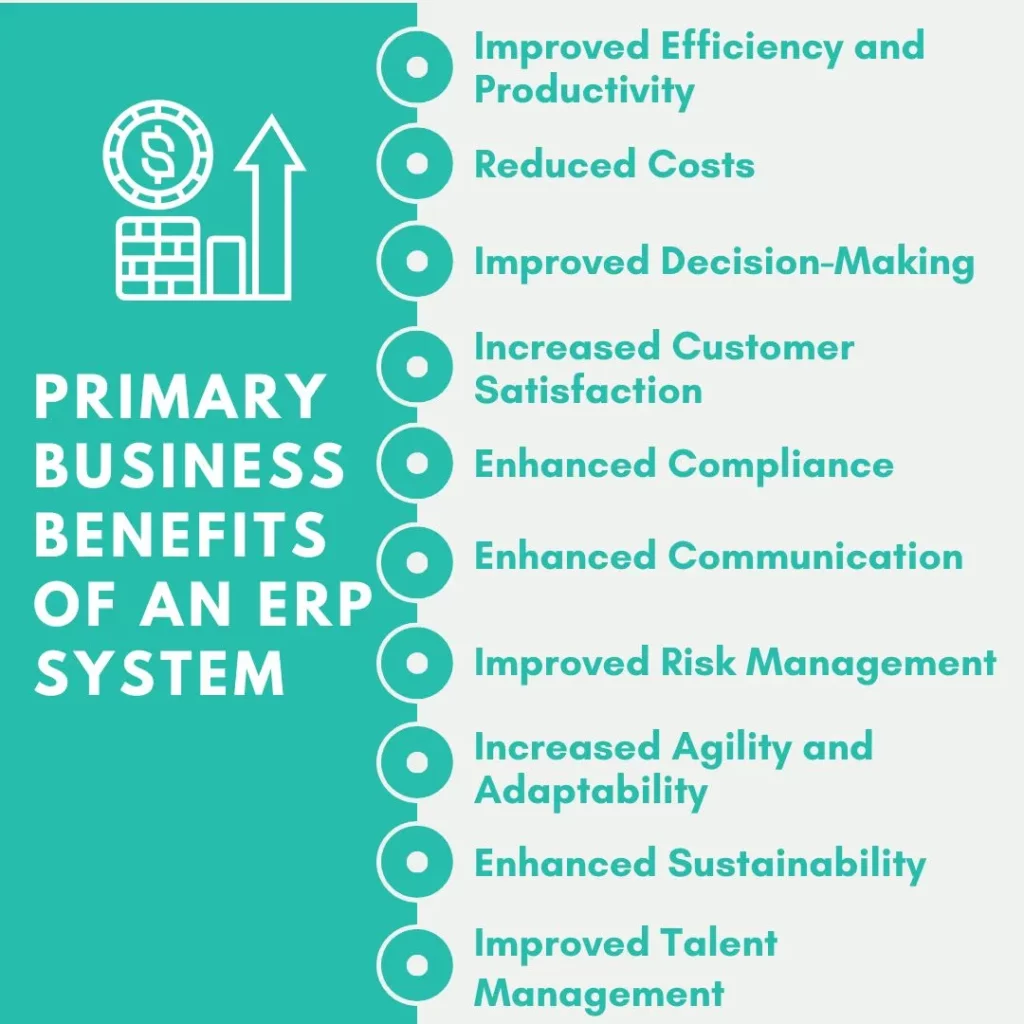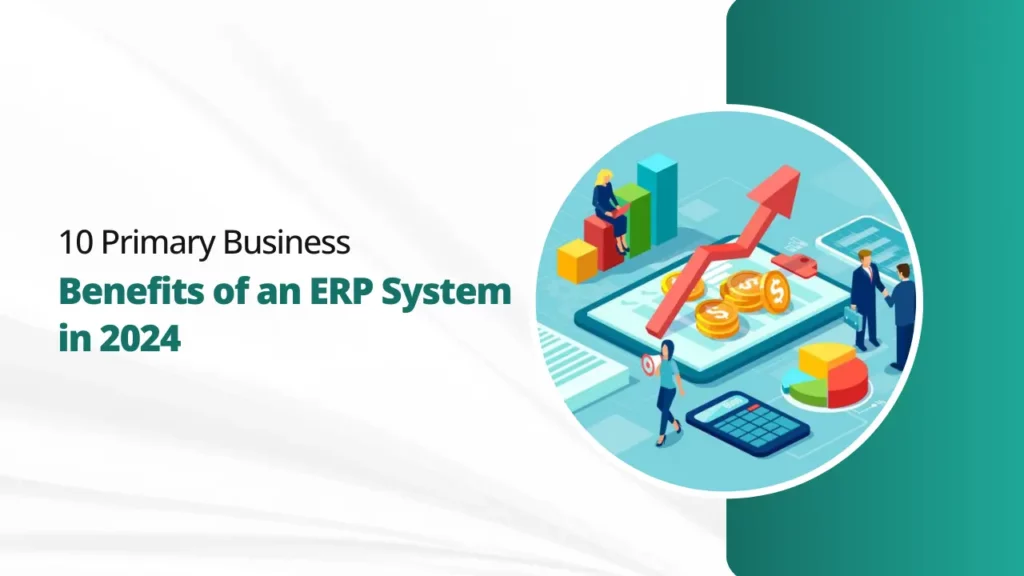Organizations constantly seek ways to enhance their operations, and ERP is a powerful tool. It addresses challenges and helps businesses in their operations to achieve remarkable results. ERP is more like the nerve center of an organization that integrates various business processes. It deals with functions from accounting and finance to supply chain and customer relationship management. Undoubtedly, ERP systems deliver an array of benefits that propel businesses toward success. There are several primary business benefits of an ERP system that you need to know before you enter 2024.
This blog post will illuminate the transformative power of these solutions. We will highlight their ability to enhance efficiency and increase customer satisfaction. This blog will show you how businesses can capitalize on these innovations to stay ahead of the curve.
Primary Business Benefits of an ERP System

ERP systems can integrate and automate a wide range of business processes. They can provide several benefits to businesses. Here are some primary business benefits of an ERP system that you should explore:
1. Improved Efficiency and Productivity
ERP systems can automate many manual tasks, such as data entry and reporting. This can free up employees to focus on more strategic work, and it can also help to reduce errors. For example, an ERP system can automate the process of invoicing customers. This can save businesses a significant amount of time and money.
- A study by Aberdeen Group found that businesses that use ERP systems see an average improvement in productivity of 20%.
- An ERP system can help companies simplify their operations, saving time and money. For example, an ERP system can help companies automate purchasing goods and services. This can save them time and money on paperwork.
- An ERP system can help businesses to improve their inventory management. This can help them to reduce stockouts and overstocks. This can save companies money and improve customer satisfaction.
2. Reduced Costs
ERP systems can help businesses save money in several ways. This includes reducing inventory costs, improving procurement efficiency, and streamlining operations. For example, an ERP system can help companies to track their inventory levels more closely. This can help them to avoid stockouts and overstocks.
- A study by Nucleus Research found that businesses that use ERP systems see an average ROI of 17%.
- An ERP system can help companies to negotiate better deals with their suppliers. It will save them money on the goods and services they purchase.
- An ERP system can help businesses identify and eliminate waste, saving them money. For example, an ERP system can help businesses to cut redundant processes.
3. Improved Decision-Making
ERP systems can provide businesses with real-time data and insights into their operations. This can help companies to allocate resources, manage inventory, and price products. For example, an ERP system can provide businesses with data on their sales performance. This will identify which products are selling well and which products are not.
- A study by the ERP Vendor Association found that with ERP systems, we can see an average improvement of 30% in decision-making.
- An ERP system can help businesses to identify trends in their sales. This helps them make better decisions about marketing their products and services.
- An ERP system can help companies to identify and address potential problems. For example, an ERP system can help firms to identify supply chain disruptions.
4. Increased Customer Satisfaction
ERP systems can improve customer service by helping businesses understand customers’ needs. This can lead to faster order processing, more accurate billing, and better customer support. For example, an ERP system can provide businesses with a complete view of their customers’ purchase history. This can help them make better recommendations.
- A study by Salesforce found that businesses that use ERP systems see an average improvement in customer satisfaction of 25%.
- An ERP system can help businesses to personalize their interactions with their customers.
- An ERP system can help companies to resolve customer issues quickly and efficiently.
5. Enhanced Compliance
ERP systems can help businesses comply with various regulations, such as Sarbanes-Oxley and HIPAA. This can help companies to avoid fines and penalties and protect their reputation. ERP can help enterprises to track their compliance with environmental regulations, etc.
- A study by KPMG found that businesses with ERP systems are 60% more likely to comply with regulations.
- An ERP system can help businesses to automate their compliance processes to save time and money.
- An ERP system can help companies to identify and address potential compliance risks. This will avoid fines and penalties.
6. Enhanced Communication
ERP systems can break down silos between departments and improve communication across the organization. This can lead to improved decision-making, faster problem-solving, and increased innovation. The ERP system can provide sales and marketing teams with a shared view of customer data, which can help them in marketing campaigns.
- An ERP system can help businesses share information between departments and improve communication.
- An ERP system can help companies identify and address potential problems early on, preventing them from becoming more significant problems.
7. Improved Risk Management
ERP systems can help businesses to identify, assess, and mitigate risks. This can help companies protect their assets, reputation, and customers. An ERP system can help businesses identify risks like potential supply chain disruptions to mitigate them.
- ERP can help businesses to track their performance against their goals to identify potential risks early on.
- An ERP system can help companies develop contingency plans for risks to reduce the impact of those risks.
8. Increased Agility and Adaptability
ERP systems can help businesses to be more agile and adaptable to change. This can help businesses to stay ahead of the competition. For example, ERP can help companies develop and launch new products to stay ahead of the competition.
- A study by Accenture found that businesses that use ERP systems are 30% more likely to be adaptable.
- An ERP system can help companies implement new technologies to improve their operations and stay ahead of the competition.
- An ERP system can help businesses adapt to new regulations, which can help them avoid penalties.
9. Enhanced Sustainability**
ERP systems improve business sustainability by reducing their environmental impact. This can help businesses to save money, improve their reputation, and attract environmentally conscious customers. Moreover, ERP can help companies to track their energy consumption and identify ways to reduce it.
- A study by Deloitte found that businesses that use ERP systems are 20% more likely to be sustainable.
- An ERP system can help companies reduce waste to improve sustainability.
- An ERP system can help businesses recycle and reuse materials, saving them money and improving their sustainability.
10. Improved Talent Management
ERP systems can improve talent management by better understanding employees’ skills. This can help businesses attract and develop top talent. ERP can also track employees’ performance and identify training needs.
- A study by Oracle found that businesses that use ERP are 15% more likely to have an engaged workforce.
- An ERP system can help them make better hiring and promotion decisions.
- An ERP system can help them improve their skills and careers.
Conclusion:
As we conclude our exploration of ERP systems, it becomes clear that these solutions have changed how businesses operate. ERP systems have emerged as indispensable tools driving business growth and success. These primary business benefits of an ERP system explain how important ERP is. ERP systems are potent allies as businesses navigate a complex and competitive world. They empower organizations to achieve operational excellence, customer satisfaction, and sustainable growth. Use the transformative power of ERP systems and take your business to new heights.
Get ERP Services from Tech Implement
Tech Implement is a leading provider of ERP services backed by a team of experienced consultants and technical experts. We take a consultative approach, carefully assessing your unique business needs and objectives to craft a customized ERP solution that aligns seamlessly with your organization’s vision.
Our comprehensive ERP services contain the entire lifecycle, from initial strategy and planning to implementation, training, and ongoing support. We partner with you every step of the way, ensuring a smooth transition and maximizing the value of your ERP investment.
Contact us for a free consultation. Let’s work together to transform your business.
FAQ
What is the key business benefit of ERP?
The key business benefit of ERP is streamlined and integrated business processes.
Why do businesses need a good ERP system?
Businesses need a good ERP system for efficient management of resources, data, and operations across various departments.
What is the largest benefit of a successfully implemented ERP system?
The largest benefit of a successfully implemented ERP system is improved organizational efficiency and enhanced decision-making through real-time data access.
How was business integration achieved by ERP systems?
Business integration in ERP systems is achieved through a centralized database that facilitates communication and data sharing among different functional areas.




